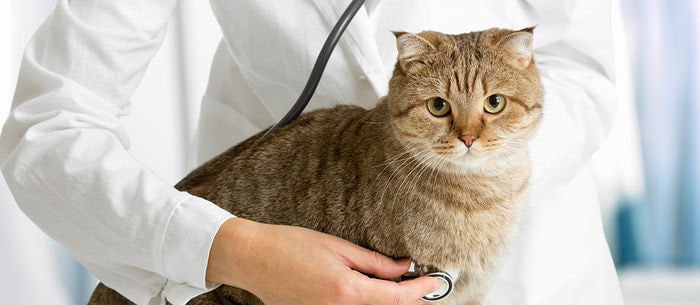Pancreatitis in any animal is a serious situation. If pancreatitis hits your beloved cat, time is of the essence to get her back on the road to recovery. But what is pancreatitis in cats? It may mirror symptoms of the flu, but it’s more nuanced than a regular stomach problem.
The pancreas produces digestive enzymes, which are secreted into the intestinal tract and become activated in digestion of carbohydrates, proteins and fats. In pancreatitis in cats, the enzymes become activated within the pancreas, leading to breakdown of the pancreatic tissue and inflammation, says Dr. Stephan Carey, a veterinarian and an assistant professor of veterinary medicine at Michigan State University.
“The pancreas starts eating itself,” says Dr. Kate Pritchett-Corning, a veterinarian in Massachusetts. Risk factors for pancreatitis in cats include viral infections such as feline infectious peritonitis (FIP), protozoal infections (primarily for outdoor cats), trauma, toxins and the presence of liver disease and gastrointestinal disease, says Dr. Carey.
Symptoms are similar to those of other common kitty digestive issues: lethargy, not eating and abdominal pain. Pancreatitis in cats can only be confirmed by a veterinarian through blood tests. Both Dr. Pritchett-Corning and Dr. Carey say that if your cat has not eaten for a day or two and is not responding to the cat sitter’s attempts to play or interact, bring her to the vet to be diagnosed and treated.
Treatment involves nutritional support, fluids and management of symptoms such as vomiting or pain. This typically isn’t something you can do at home, and often your cat will need to be hospitalized. Most cats recover after a bout of pancreatitis, as long as they receive supportive treatment early. “In most cases we can get them through. While it can be scary, it’s usually manageable,” Dr. Carey says.
Dr. Carey notes that it’s very important to provide nutritional support early in the course of the disease, because when a cat doesn’t eat, he begins to metabolize his fat stores, which can predispose cats to a serious condition called hepatic lipidosis, or “fatty liver.” Fluids are important in maintaining the blood supply to the pancreas, which doesn’t respond well to a restricted blood supply.
Veterinarians may ask the owner what the cat might have been exposed to, indoors or outside. He or she is also likely to ask:
- What does the cat typically eat?
- Does the cat have a history of gastrointestinal disease or liver disease?
- Has the cat had similar symptoms before? Pancreatitis can be acute or chronic, and if these symptoms recur, that could point to pancreatitis rather than something else as the culprit.
- Is there anything unusual about the cat’s medical history?
- Did your cat fall from a high place or suffer another trauma?
Owners should ask the vet:
- How severe is my cat’s case?
- Is there anything in my cat’s history that you think caused this?
- For how long might my cat need to be treated?
In short, if you feel like something is wrong, don’t wait too long to get your cat seen, says Dr. Pritchett-Corning. “Be your cat’s advocate — take him to the vet if you think he’s unwell,” she says. “Cats are pretty stoic, and if you try to wait it out, you may lose your cat.” Cats generally don’t like to show they’re feeling pain or not doing well, so if you see obvious symptoms, it means something is wrong.
Pancreatitis in cats is serious but treatable. Before too long, you’ll have your furry friend home with you again, ready to play!
Amy Kuras is a Detroit-based journalist who shares her home with one husband, two children, one dog and two cats.
*This article is for general informational purposes only. It is not intended nor implied to be providing medical advice and is not a substitute for such advice. The reader should always consult a health care provider concerning any medical condition or treatment plan. Neither Care.com nor the author assumes any responsibility or liability with respect to use of any information contained herein.




